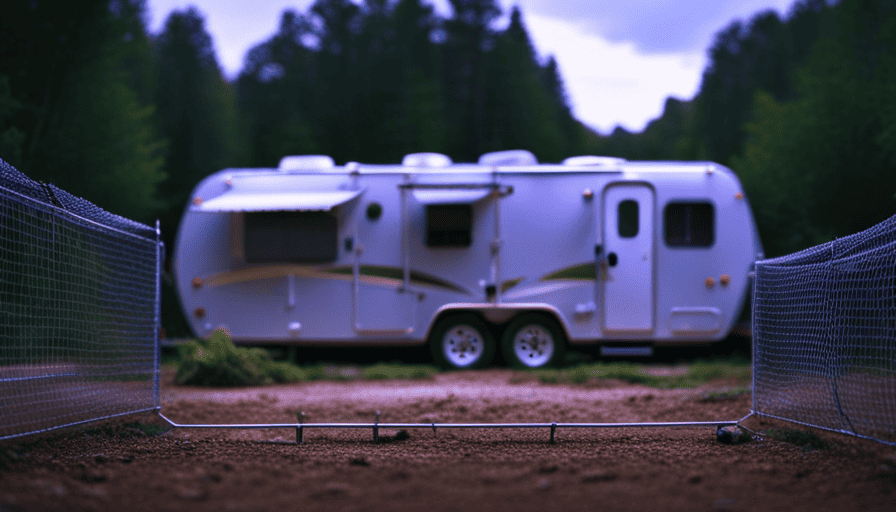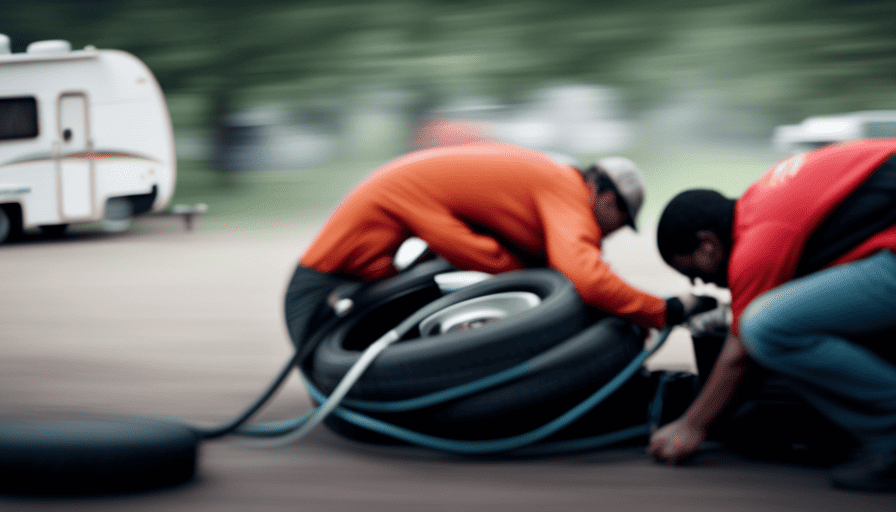Have you ever had to deal with the frustration of finding unwelcome guests in your camper trailer? It’s like dealing with a bothersome visitor who overstays their welcome and leaves a mess behind.
Just like a determined mouse squeezing through a tiny hole, these intruders can find their way into even the tiniest cracks and crevices of your beloved camper. But fear not, for I have the ultimate guide to keeping those mice out and preserving the sanctity of your home away from home.
In this article, I will share with you a plethora of practical tips and tricks to fortify your camper against these unwelcome critters. From sealing entry points and cracks to using natural deterrents and setting traps, I’ve got you covered.
We’ll explore the importance of storing your food properly and keeping a clean and tidy camper. I’ll even introduce you to the wonders of ultrasonic devices and mesh screens to keep those mice at bay.
So, grab your metaphorical toolbox and let’s get to work on keeping those pesky mice out of your camper trailer once and for all!
Key Takeaways
- Sealing entry points and cracks with caulk or steel wool is essential in preventing infestations.
- Proper food storage in airtight containers is crucial in keeping mice out.
- Regular inspections and cleaning up spills and crumbs are important.
- Natural deterrents such as peppermint oil, vinegar and water, and cayenne pepper can help keep mice away.
Seal Entry Points and Cracks
To keep mice out of your camper trailer, you’ll want to make sure you seal any entry points and cracks with caulk or steel wool. This is an essential step in preventing infestations and ensuring that your camping experience is mouse-free.
Mice can easily squeeze through small openings, so it’s important to thoroughly inspect your trailer for any gaps or holes. Pay close attention to areas where pipes and wires enter the trailer, as these are common entry points for rodents. Use caulk to seal any cracks in the walls or floors, and stuff steel wool into larger openings to deter mice from entering.
If you’re not confident in your sealing skills, it may be worth considering professional pest control services. They have the expertise and tools to effectively seal off any potential entry points, giving you peace of mind during your camping trips. Additionally, professionals can offer advice on other preventive measures to keep mice away from your trailer.
Now that you’ve sealed off potential entry points, it’s time to focus on another important aspect of keeping mice out of your camper trailer: keeping your food stored properly.
Keep Food Stored Properly
Make sure your food is stored securely in airtight containers, preventing any unwanted visitors from sneaking in. Proper food storage is crucial in keeping mice out of your camper trailer. Mice are attracted to food sources, and if they find their way into your trailer, they can cause damage and spread disease.
To avoid this, store all food, including dry goods, in sealed containers that mice can’t chew through. This will not only keep your food safe from mice but also help maintain its freshness.
Regular inspections are also important to ensure that there aren’t any food crumbs or spills that mice can be attracted to. Clean up any spills immediately and sweep the floors regularly. Pay special attention to the kitchen area where food’s prepared and consumed.
In addition to proper food storage and regular inspections, using natural deterrents can also help keep mice away from your camper trailer. These can include peppermint oil, mothballs, or ultrasonic devices that emit high-frequency sounds mice find unpleasant.
By incorporating these strategies, you can effectively prevent mice from entering your camper trailer and enjoy a pest-free camping experience.
Use Natural Deterrents
Ensure a pest-free camping experience by using natural deterrents that will have those unwanted visitors fleeing in terror. When it comes to keeping mice out of camper trailers, there are several natural mouse repellents and homemade mouse deterrents that can be effective. These options are not only safe for you and the environment but also easy to make and use.
One of the most effective natural mouse repellents is peppermint oil. Mice hate the strong smell of peppermint, so simply soak cotton balls in peppermint oil and place them in areas where mice are likely to enter your camper trailer. Another option is to use a mixture of vinegar and water. Spray this solution around the exterior of your camper trailer to create a barrier that mice will avoid.
Additionally, you can create a homemade mouse deterrent using a combination of cayenne pepper and garlic powder. Mice dislike the strong odor of these spices, so sprinkle the mixture around areas where mice are likely to enter your camper trailer.
By using these natural deterrents, you can effectively keep mice out of your camper trailer without relying on harmful chemicals. However, if you do find signs of mice despite your best efforts, it may be necessary to set traps and baits to eliminate them completely.
Set Traps and Baits
Using traps and baits is an effective method for eradicating unwanted critters from your camping experience. When it comes to trapping mice, it’s important to employ effective trapping techniques.
The first step is to identify areas where mice are likely to travel, such as along walls or near food sources. Place traps in these areas, ensuring they’re secure and won’t be accidentally triggered by other campers or pets. Snap traps are a popular choice for catching mice, as they’re easy to set up and can be highly effective.
Choosing the right bait for mice traps is crucial. Mice are attracted to a variety of foods, including peanut butter, chocolate, and dried fruits. Experiment with different baits to see which one works best for you. Place a small amount of bait on the trigger of the trap, making sure to keep your fingers clear. This’ll entice the mice to step on the trigger and activate the trap.
Incorporating traps and baits into your mouse control strategy can significantly reduce the number of critters in your camper. However, it’s important to remember that trapping is just one part of the solution. To fully prevent future infestations, it’s essential to keep the camper clean and tidy. This’ll discourage mice from finding food sources and nesting areas, ensuring a critter-free camping experience.
Keep the Camper Clean and Tidy
To maintain a critter-free camping experience, make sure to regularly tidy up and keep your living space in the camper clean. This not only helps prevent mice from being attracted to your camper but also creates a more pleasant environment for you and your fellow campers.
Here are some organizational tips and pest control methods that can help keep mice out of your camper.
First, keep all food tightly sealed in airtight containers and store them in high cabinets or secure areas. Mice are attracted to food sources, so eliminating their access to it is crucial. Additionally, regularly sweep and vacuum the floors to remove any crumbs or food particles that may have fallen.
Next, declutter your camper and remove any unnecessary items that mice can use as nesting materials. Mice are resourceful creatures and can make nests out of various materials such as paper, fabric, or insulation. By keeping your camper tidy and free of clutter, you eliminate potential nesting spots for mice.
By following these organizational tips and pest control methods, you can greatly reduce the likelihood of mice infesting your camper.
In the next section, we’ll discuss how to remove nesting materials without using harmful chemicals or methods.
Remove Nesting Materials
Clearing out nesting materials is an essential step in creating a critter-free camping space. To prevent mice from making a cozy home in your camper, it’s important to take preventive measures and remove any potential nesting materials.
Mice are resourceful creatures that can use a variety of materials to build their nests, such as fabric, paper, and even insulation. Start by thoroughly inspecting every nook and cranny of your camper for signs of nesting, such as shredded fabric or droppings. Remove any materials that could be used for nesting, including old blankets, pillows, and cardboard boxes.
It’s also crucial to seal off any openings or gaps where mice can enter, such as vents, pipes, and electrical openings. If you suspect a severe infestation or are unsure about removing nesting materials yourself, consider hiring a professional extermination service to ensure a thorough job.
By taking these steps, you can significantly reduce the chances of mice finding a home in your camper.
As we move on to the next section about using ultrasonic devices, we’ll explore another effective way to keep mice at bay.
Use Ultrasonic Devices
By harnessing the power of ultrasonic devices, campers can send unwanted critters scurrying away from their cozy habitats. Ultrasonic devices emit high-frequency sound waves that are inaudible to humans but unbearable to mice. These devices work by creating a hostile environment for the rodents, making them want to flee.
The effectiveness of ultrasonic devices in keeping mice out of camper trailers varies. Some campers swear by them, claiming that they have successfully kept mice at bay. However, others have found them to be less effective, with mice seemingly unfazed by the ultrasonic waves. It’s important to note that ultrasonic devices may work better as a preventive measure rather than a solution for an existing mouse problem.
If ultrasonic devices aren’t proving effective for your camper trailer, there are alternative methods you can try. One option is to use natural repellents such as peppermint oil or dryer sheets, which mice find unpleasant. Another approach is to keep all food stored in airtight containers and thoroughly clean your camper trailer to remove any traces of food that might attract mice. Additionally, you can install mesh screens on vents and openings to further fortify your camper against mouse intrusion. This will help prevent mice from entering while allowing proper ventilation for your camper trailer.
Install Mesh Screens on Vents and Openings
To effectively keep mice out of camper trailers, it’s essential to explore various preventive measures. One effective method is to install mesh screens on vents and openings. This not only helps in keeping mice at bay but also offers several other benefits.
-
Protection from pests: Mesh screens act as a physical barrier, preventing mice and other pests from entering the camper trailer through vents and openings.
-
Improved airflow: By installing mesh screens, you can ensure proper ventilation inside the trailer without compromising on safety.
-
Easy maintenance: Mesh screens are relatively easy to clean and maintain, making it convenient for trailer owners.
-
Cost-effective solution: Compared to other preventive measures, installing mesh screens is a cost-effective solution that provides long-term protection against mice infestation.
While installing mesh screens may seem like a simple task, there can be potential challenges. Some vents and openings may require custom-sized screens, which might be difficult to find. In such cases, seeking professional help or consulting camper trailer manufacturers can provide suitable solutions.
Transitioning into the next section, another effective method to keep mice away from camper trailers is to place mothballs or cotton balls soaked in peppermint oil.
Place Mothballs or Cotton Balls Soaked in Peppermint Oil
You can enhance the effectiveness of your mouse prevention efforts by placing mothballs or cotton balls soaked in peppermint oil inside your camper trailer. Both mothballs and peppermint oil have been known to repel mice due to their strong scent.
However, there are some differences between the two in terms of their effectiveness and comparison. Mothballs contain a chemical called naphthalene, which emits a strong odor that is unpleasant to mice. When placed strategically in your camper, the scent of mothballs can deter mice from entering. However, it’s important to note that mothballs can be toxic to humans and pets if ingested. Therefore, it’s crucial to handle them with care and keep them out of reach.
On the other hand, peppermint oil is a natural repellent that is safe for humans and pets. Mice are known to dislike the strong smell of peppermint, making it an effective deterrent. Soaking cotton balls in peppermint oil and placing them in areas prone to mouse infestations can help keep these critters at bay.
In comparison, while both mothballs and peppermint oil can be effective in deterring mice, peppermint oil is a safer and more environmentally friendly option. By using peppermint oil-soaked cotton balls, you can keep mice out of your camper without risking harm to yourself or your loved ones.
To further protect your camper from mice, it’s important to regularly inspect and maintain it. This will help identify and address any potential entry points or issues that may attract mice.
Regularly Inspect and Maintain the Camper
After implementing the previous method of using mothballs and peppermint oil to keep mice out of my camper trailer, it’s important to continue with regular inspection and maintenance to ensure their effectiveness. By taking a proactive approach and being diligent in my efforts, I can minimize the chances of mice infestation and keep my camper safe and rodent-free.
Inspecting for potential damage is crucial in preventing mice from entering the camper. I make sure to thoroughly examine the exterior of the trailer, checking for any cracks, holes, or gaps where mice can squeeze through. I pay close attention to areas around windows, doors, vents, and utility connections, as these are common entry points for rodents.
Regularly checking for signs of mice inside the camper is another essential step. I look for droppings, chewed wires or insulation, and any unusual odors that may indicate their presence. If I spot any signs, I take immediate action to eliminate the problem before it escalates.
To effectively prevent mice from entering my camper, I follow these steps:
- Seal any potential entry points with silicone caulk or steel wool.
- Keep the camper clean and free of food crumbs or spills that may attract mice.
- Use mouse traps or bait stations as a precautionary measure.
By regularly inspecting and maintaining my camper, I can keep mice at bay and enjoy my camping adventures without any unwanted guests.
Frequently Asked Questions
Can mice still enter the camper even if all entry points and cracks are sealed?
I wanted to find out if mice can still enter a camper even if all entry points and cracks are sealed. After conducting some research and speaking with experts, I discovered that while sealing off all potential entry points is a great first step, it may not completely prevent mice from getting in.
Mice are incredibly resourceful and can squeeze through tiny openings. To further deter them, consider using natural deterrents and implementing effective cleaning methods to eliminate any potential food sources.
What are some natural deterrents that can be used to keep mice away from camper trailers?
Natural deterrents can be effective in preventing a mice infestation in camper trailers. One option is peppermint oil, which repels mice due to its strong scent. Simply soak cotton balls with peppermint oil and place them in strategic areas of the trailer. Another option is to use dryer sheets, which mice dislike.
In addition to using these deterrents, it’s important to keep the camper clean and free of food crumbs, as this will make it less inviting for mice. Regularly inspecting the trailer for any potential entry points is also key.
How often should traps and baits be checked and replaced?
A wise man once said, "The early bird catches the worm." When it comes to trapping mice, this adage holds true. To effectively control the infestation, it’s crucial to check traps and replace baits regularly.
I recommend checking traps at least once a day, preferably in the morning, to ensure you catch any mice caught overnight. As for replacing traps and baits, it should be done every 2-3 days to maintain their effectiveness.
Are there any specific cleaning products or methods that are effective in keeping mice away?
Ultrasonic devices may be effective in repelling mice from camper trailers. These devices emit high-frequency sound waves that are said to be unpleasant for mice, causing them to seek out quieter areas. However, their effectiveness can vary, and some mice may become accustomed to the sound over time.
As for scents, mice are known to be repelled by strong smells such as peppermint, ammonia, and vinegar. These scents can be used in camper trailers to deter mice from entering.
How frequently should the camper be inspected and maintained to prevent mice infestation?
Inspecting and maintaining your camper regularly is essential to prevent mice infestation. The frequency of camper maintenance should be at least once every few months, depending on your camping habits and the environment.
Look out for signs of mice infestation such as droppings, chewed wires, and nesting materials. By staying proactive and addressing any potential issues promptly, you can keep your camper rodent-free and enjoy worry-free camping trips.
What are the Best Methods for Keeping Mice Out of Camper Trailers?
When it comes to keeping mice out of camper trailers, prevention is key. Seal any cracks or openings with steel wool and use caulk or foam to fill in gaps. Store food in secure containers and keep the camper clean. Use mothballs or peppermint oil as deterrents, and set up traps to catch any sneaky intruders. These methods can help keep mice out of camper trailers, ensuring a pest-free and enjoyable trip.
Conclusion
Well, folks, that’s a wrap! We’ve covered all the tricks and tips to keep those pesky mice out of your beloved camper trailers. By sealing entry points, storing food properly, using natural deterrents, setting traps and baits, keeping the camper clean, using ultrasonic devices, installing mesh screens, and placing peppermint-soaked cotton balls, you’ll be able to enjoy your camping trips without any unexpected furry guests.
Remember to regularly inspect and maintain your camper to ensure it stays mouse-free. So go ahead, hit the road, and have a mouse-free adventure!










